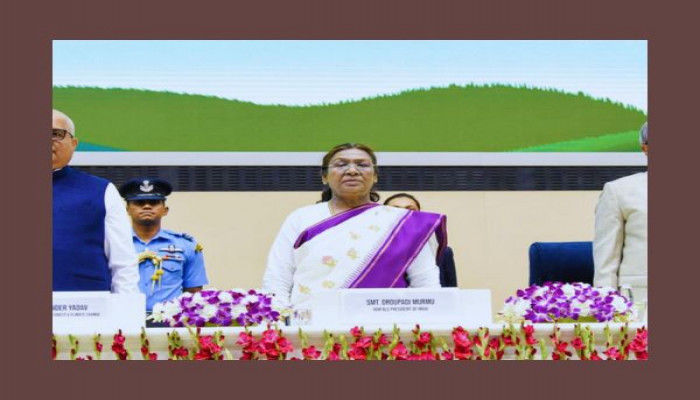President Droupadi Murmu inaugurates National Conference on Environment 2025
- In Reports
- 12:10 AM, Mar 30, 2025
- Myind Staff
Union Environment Minister Bhupender Yadav reaffirmed India’s commitment to sustainable growth while addressing the two-day National Conference on ‘Environment–2025’ organised by the National Green Tribunal (NGT) in New Delhi. Inaugurated by President Droupadi Murmu, the conference brought together key policymakers, legal experts, and environmental advocates to discuss pressing ecological challenges.
India's Commitment to Climate Goals
During his speech, Yadav emphasised that India has achieved its Paris Agreement green energy commitments nine years ahead of the 2030 deadline. He asserted, “India reserves her right to grow responsibly based on national circumstances.” Acknowledging the global climate crisis, he maintained that it should not hinder India’s ability to provide food, water, energy, and a quality life to its 140 crore citizens. Under the current leadership, he noted, the country is successfully balancing environmental challenges with economic opportunities.
Lessons from the Past and the Green Revolution
Highlighting historical challenges, Yadav recalled the severe hunger crisis of the 1970s that impacted nearly one-third of India and 35% of the developing world. “The developed world did not reduce its food consumption to address global hunger,” he remarked. Instead, India pioneered the Green Revolution by enhancing agricultural productivity through scientific advancements, improved seed varieties, and better technology. Today, he stated, the country continues to focus on capacity-building, knowledge-sharing, and global collaboration to address climate change, biodiversity loss, and desertification.
Innovations in Low-Carbon Technology and Energy Development
Yadav underscored India's progress in low-carbon innovations and sustainable technologies, calling rapid economic growth the most effective tool against climate change for developing nations. He highlighted the Nuclear Energy Mission for Viksit Bharat, introduced in the Budget 2025-26, which aims to accelerate nuclear power development. By 2047, India aspires to be a global leader in advanced nuclear technology. He also pointed out that India's Ramsar site network has expanded to 89, demonstrating efforts to conserve wetlands.
“As one of the world’s largest and fastest-growing economies, India is committed to reducing its carbon footprint while generating millions of jobs in the green energy sector. Solar power has emerged as a key force driving environmental sustainability and economic growth,” he added.
Call for a National Environmental Commission
Attorney-General R. Venkataramani advocated for the establishment of a national commission on environmental policy and adjudication. He stressed that India should focus on effective enforcement rather than getting discouraged by unfavourable global environmental rankings. “We are entering a new machine age—an era of both great progress and significant waste. Economic disparities and global inequalities present challenges. Alarmist reports about India’s environmental standing are inevitable in a world divided by national interests,” he remarked.
He further stated, “We cannot compromise on our responsibilities to tackle inequality, poverty, and social justice. India has the potential to meet these obligations. Instead of fixating on negative global indices, we must redesign institutions for better governance.”
Addressing Pollution and Environmental Degradation
Justice Vikram Nath of the Supreme Court highlighted the severe environmental stress on India’s natural ecosystems. He pointed out the increasing levels of urban smog, industrial effluents contaminating rivers, and growing water scarcity. “One of the most pressing issues is air pollution. It is unacceptable for our children to grow up in an environment where they need masks just to play outside,” he asserted.







Comments